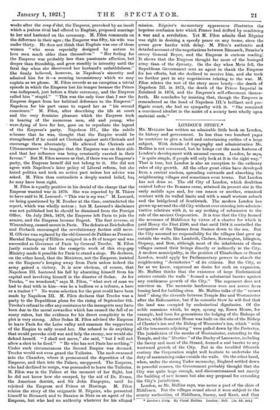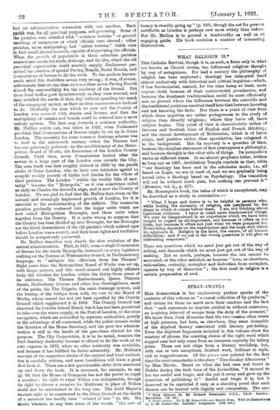LONDON'S STORY.*
MR. MI:muss has written an admirable little book on London, its history and government. In less than two hundred pages he contrives to give a lucid and entertaining outline of a large subject. With details of topography and administration Mr. Mullins is not concerned, but he brings cut the main features of London's development with unusual success, London, he says, " is quite simple, if people will only look at it in the right way.". That is true, but London is also an exception to the ordinary rules of city growth. All the other great cities have developed from a central nucleus, spreading outwards and absorbing the neighbouring villages and sometimes even towns. But London has not done so. The old City of London, which doubtless existed before the Romans came, attained its present size in the early middle ages and, for one reason or another, remained content with its walled limits and with a small western suburb and the bridgehead of Southwark. The modem London has grown up around the old City without ever entering into adminis-: trative relations with it, to say nothing of submission to the rule of the ancient Corporation. It is true that the City farmed the revenues of Middlesex by virtue of a charter for which it paid Henry the First £300, and that until 1864 it controlled the navigation of the Thames from Staines down to the sea. But the City assumed no responsibility for the villages that grew up outside the walls, like Lambeth, Chelsea, Kensington, Islington, Stepney, and Bow, although most of the inhabitants of these- villages earned their livings directly or indirectly in the City. A modern municipality, in the position of Elizabethan or Stuart London, would apply for Parliamentary powers to absorb the neighbouring " dormitories " of its citizens. But the City, so far as we know, expressed no desire for such an expansion. Mr. Mullins thinks that the existence of large Ecclesiastical estates outside the walls " formed a substantial barrier against any continuous growth of the City." Tho argument does not convince us. The monastic landowners were not averse from leasing land for building sites. Mr. Mullins talks of the " vacant land " along the riverside between Temple Bar and Westminster after the Reformation, but if he consults Stow he will find that the land was occupied by ecclesiastical dignitaries. Of the noble mansions which, he says, sprang up, Essex House, for example, had been for generations the lodging of the Bishops of Exeter, while Somerset House was built on the site of the Bishop of Chester's inn and the Bishop of Worcester's inn, which " with all the tenements adjoining " were pulled down by the Protector. The jurisdiction of the monks of Westminster, extending to the Temple, and the " liberties " of the Duchy of Lancaster, including the Savoy and moat of the Strand, formed a real barrier to any westward growth of the City. But in the troubled fifteenth century the Corporation might well hesitate to undertake the duty of maintaining order outside the walls. On the other hand, when, under the strong Tudor monarchy, England settled down in peaceful courses, the Government probably thought that the City was quite large enough, and discountenanced not merely the building of new houses but also any proposal for extending the City's jurisdiction.
London, as Mr. Mullins says, was never a part of the shire of Midd]esex. But the villages round about it were subject to the county authorities, of Middlesex, Surrey, and Kent, and thus • London's Story, By Claud Mullins. London: Bell. 124. Od. nett had no administrative connexion with one another. Each wish was, for all practical purposes, self-governing. Some of the parishes were satisfied with " common vestries " or general meetings of ratepayers at which officials were elected ; other parishes, more enterprising, had " select vestries " which were in fact small elected councils, capable of supervising the officials. When the growth of population in these suburban parishes *mated new needs, for roads, drainage, and the like, which the old parochial organization could scarcely supply, Parliament per- mitted the creation of special Paving Boards, Burial Boards, and Commissions of Sewers to do the work. To the modern bureau- oratio mind this doubtless seems very wrong ; it was, of course, unfortunate that at one time no fewer than seven Paving Boards shared the responsibilitl for the roadway of the Strand. But these local bodies grew spontaneously as they were wanted, and they satisfied tho needs of their day without spending too much of the ratepayers' money, as their modern successors are inclined to do. Gradually the area which wo now call the County of London was covered with streets and houses, and then the multiplicity of vestries and boards could be reduced into a more orderly system. The first step towards a common authority, Mr. Mullins points out, was taken in 1532, when Parliament provided that Commissions of Sewers might be set up in Outer London. The necessity for some common drainage scheme was to lead in the nineteenth century—when the Thames had become grievously polluted—to the establishment of the Metro- politan Board of Works, the forerunner of the London County CounoiL Until then, seven Commissions looked after the sewers in a large part of the London area outside the City. The area itself was first roughly defined in 1603 by the parish clerks of Outer London, who on their own initiative agreed to compile weekly records of births and deaths for the whole of their parishes. The London " within the weekly bills of mor- tality " became the " Metropolis," as it was sometimes called as early as Charles the Second's reign, and is now the County of London. We are glad to find that Mr. Mullins lays stress on the natural and seemingly haphazard growth. of London, for it is essential to tho understanding of the subject. The numerous parishes gradually coalesced into the larger units which are now called Metropolitan Boroughs, and these units taken together form the County. It is quite wrong to suppose that the County has been divided up into Boroughs, for the Boroughs are the lineal descendants of the old parishes which existed ages before London was a county, and their local rights and traditions should be scrupulously preserved.
Mr. Mullins describes very clearly the slow evolution of the central administration. First, in 1847, came a single Commission of Sewers for the whole Metropolis, inasmuch as every legislator walking on the Terrace at Westminster desired, in Parliamentary language, to " mitigate the effluvium from the Thames." Eight years later the Metropolitan Board of Works was set up, with larger powers, and this much-abused and highly efficient body did wonders for London within the thirty-throe years of its existence. The Thames Embankment, Queen Victoria Street, Shaftesbury Avenue and other fine thoroughfares, most of the parks, the Fire Brigade, the main drainage system, and the freeing of the bridges from tolls, we owe to the Board of Works, whose record has not yet been equalled by the County Council which supplanted it in 1888. The County Council has absorbed the London School Board, but it has not been permitted to take over the water supply, or the Port of London, or the river navigation, which are controlled by separate authorities, greatly to the advantage of all concerned, while the police remain under the direction of the Home Secretary, and the poor law adminis- tration is still in the hands of the guardians elected for the purpose. The City Corporation, it is to be noted, remains the Port Sanitary Authority because it offered to do the work at its own expense in 1872, when no other authority was available, and because it has fulfilled its duties admirably. Mr. Mullins's account of the respective duties of the central and local authori- ties is carefully written, and most Londoners will learn a good deal from it. There are a few questionable obiter dicta scattered up and down the book. It is incorrect, for example, to say (p. 49) that the House of Commons has not the power to expel a member ; its right to expel Wilkes was indisputable, though its right to choose a member for Middlesex in place of Wilkes could not be maintained in the long run. The Lord Mayor's ancient right to be summoned to the Privy Council at the death of a monaroh has hardly been " refused of late " (p. 88). We doubt whether, in any true sense of the words, " the rate of
lunacy is steadily going up " (p. 105), though the net for persons certifiable as lunatics is perhaps oast more widely than before. But Mr. binning is in general a trustworthy as well as an engaging guide. His book contains a number of interesting illustrations.











































 Previous page
Previous page